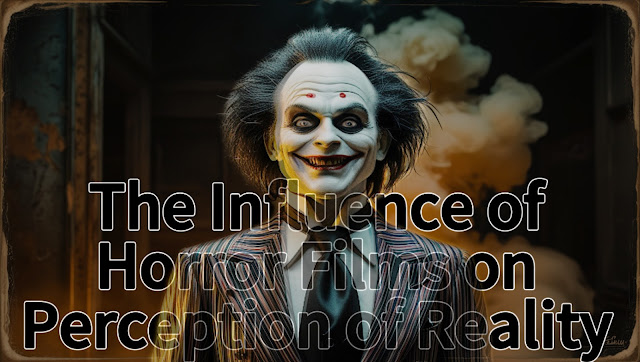- Get link
- X
- Other Apps
- Get link
- X
- Other Apps
Horror films have long captivated audiences with their ability to evoke fear, anxiety, and suspense. From early classics like *Psycho* to modern blockbusters such as *It* and *Get Out*, the horror genre has evolved, yet its core purpose remains unchanged: to explore our deepest fears. However, the impact of these films extends beyond mere entertainment; they can significantly influence how viewers perceive reality and respond to the world around them.
Understanding the Genre
Horror films are designed to provoke strong emotional responses, often using graphic imagery, suspenseful soundtracks, and unsettling narratives. The genre plays on primal fears—fear of the unknown, fear of death, and fear of loss of control. These elements can create a visceral experience that lingers long after the credits roll. Research indicates that viewers often recall specific scenes and themes, which can shape their perceptions and reactions in real life.
For instance, the character of Pennywise in Stephen King's *It* has become an iconic figure of fear. The 1990 miniseries and its 2017 adaptation both portray this shape-shifting entity in ways that resonate with viewers' fears of childhood and the unknown. The chilling line, "You'll float too!" taps into parental fears about the safety of their children, illustrating how horror films can evoke real-life anxieties.
Psychological Effects of Horror Films
The psychological impact of horror films is profound. Studies have shown that exposure to graphic content can lead to heightened anxiety and fear. Viewers may find themselves imagining scenarios that mimic the horrifying events depicted on screen, leading to a distorted perception of reality. This phenomenon is particularly evident among younger audiences, who may struggle to differentiate between fiction and reality.
A study published in *Frontiers in Psychology* highlights that individuals who perceive greater realism in horror films are more negatively affected by their exposure compared to those who view them as purely fictional. This suggests that the more relatable the horror, the more likely it is to seep into the viewer's psyche, influencing their thoughts and behaviors.
Fear Conditioning and Hypervigilance
One of the most significant effects of watching horror films is fear conditioning. This psychological process involves learning to associate certain stimuli with fear responses. After watching a particularly frightening film, individuals may become hypervigilant, constantly on the lookout for potential dangers that mirror the film's content. For example, a viewer who has just watched a home invasion thriller might feel anxious when alone at home, interpreting ordinary noises as threats.
Moreover, the fear elicited by horror films can lead to avoidance behaviors. Individuals may start to avoid places or situations that remind them of the film, limiting their activities and social interactions. This can create a cycle of fear that reinforces anxiety and impacts daily life.
The Role of Cultural Context
Cultural context also plays a vital role in how horror films are perceived. Different cultures have varying thresholds for fear and violence, which can influence how audiences react to specific films. For instance, the horror genre in Asian cinema often incorporates supernatural elements, tapping into cultural beliefs about spirits and the afterlife, as seen in films like *The Ring* or *The Grudge*. These films resonate deeply with audiences familiar with these cultural narratives, amplifying their impact.
Conversely, Western horror often focuses on psychological terror and real-world fears, as demonstrated in films like *Get Out*. This film critiques societal issues such as racism and exploitation, making its horror not just a product of fiction but a reflection of reality. The psychological horror in *Get Out* highlights how societal fears can manifest in cinematic form, influencing viewers' perceptions of their own realities.
Coping Mechanisms and the Paradox of Enjoyment
Despite the fear and anxiety that horror films can induce, many people continue to seek out these experiences. This paradox can be explained through several psychological theories. One theory suggests that horror films provide a safe space to confront fears, allowing viewers to explore their anxieties in a controlled environment. The thrill of fear can lead to a cathartic release, offering a sense of relief once the film concludes.
Additionally, the concept of "sensation-seeking" plays a role in the enjoyment of horror. Some individuals are drawn to the adrenaline rush that comes with fear, finding excitement in the suspense and unpredictability of horror films. This thrill-seeking behavior can lead to a greater tolerance for fear-inducing content, further influencing how one perceives and reacts to real-life situations.
The influence of horror films on perception of reality is a complex interplay of psychological, cultural, and emotional factors. While these films can evoke fear and anxiety, they also serve as a mirror reflecting societal fears and personal anxieties. Understanding the effects of horror films can empower viewers to navigate their experiences more mindfully, allowing them to enjoy the thrill of fear while maintaining a healthy perspective on reality. As the genre continues to evolve, its impact on our perceptions and behaviors will undoubtedly remain a topic of fascination and study.

Comments
Post a Comment